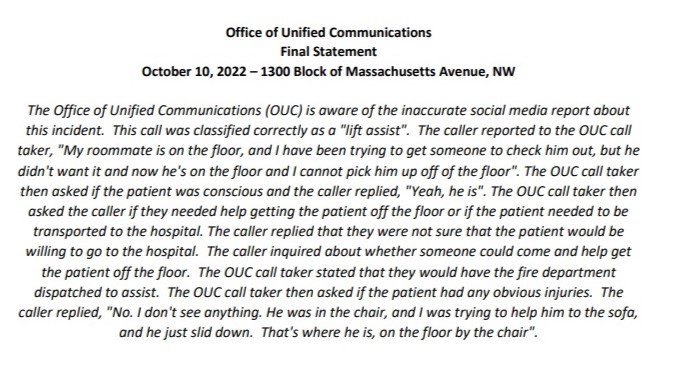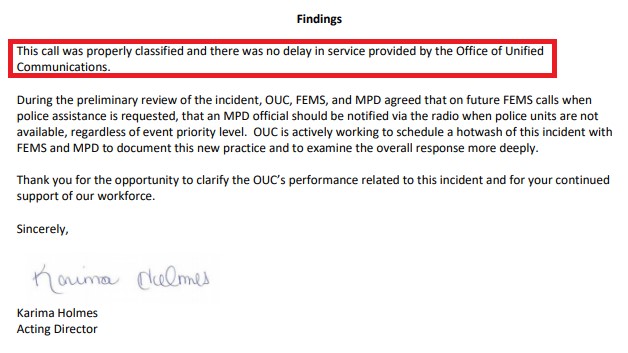Help delayed, people die while DC 911 spins & hides
STATter 911 has parts of 911 call that were omitted in an attempt to justify a 20-minute delay sending paramedics to a dying man

Looking for a quality used fire truck? Selling one? Visit our sponsor Command Fire Apparatus
DC 911 withheld key information to justify a 20-minute delay sending paramedics to a dying man. A recent statement says the incident “was classified correctly” as a non-emergency. It quotes directly from the 911 call. STATter911 has learned that statement (above) omits phrases from the 911 caller that should have alerted the call-taker they were likely dealing with a serious medical emergency. STATter911 is now able to fill in those blanks and share what DC 911 refuses to tell you about the incident.
In addition, the statement’s quotes from the 911 call appear to contradict a claim by the Office of Unified Communications (OUC) that releasing such information is an “invasion of personal privacy”. This episode is another example of the lack of transparency and candor that occurs when DC 911 investigates itself.
Here’s what’s missing
As STATter911 previously reported, the October 10 call to an apartment at 1301 Massachusetts Avenue NW was classified as a non-emergency “lift assist” to help a man off the floor. Because of the classification, it took 20-minutes before firefighters arrived, determined the man was in cardiac arrest, and called for paramedics. The man died. STATter911 has not learned his identity.
The elderly woman 911 caller described herself as the man’s roommate. In its October 26 “final statement” defending the call being classified as a low priority, DC’s Office of Unified Communications wrote:
“My roommate is on the floor, and I have been trying to get someone to check him out, but he didn’t want it and now he’s on the floor and I cannot pick him up off of the floor”. The OUC call taker then asked if the patient was conscious and the caller replied, “Yeah, he is”.
What DC 911 didn’t share is what the caller said immediately after, “Yeah, he is”. According to multiple people familiar with the call the woman said, “Yeah, he is. I keep calling his name but now he’s not answering me.”
That phrase should have indicated to the 911 call-taker this was something more than a non-emergency “lift assist”. This was indication the man was not responsive, and the call involved a serious medical emergency. Sources within OUC and elsewhere in DC government tell STATter911 that upon hearing that the call-taker should have further verified whether the man was breathing and had a pulse.
People who have listened to the 911 recording say the caller was extremely calm and did not overtly convey a sense of urgency. They also point out there were other clues or cues left out of DC 911’s statement vindicating the agency. For example, the caller also told 911, “I cannot lift him. He’s like dead weight.”
There’s even an important clue in the quote DC 911 used to defend the handling of the call. The woman said, “I have been trying to get someone to check him out, but he didn’t want it and now he’s on the floor”. This is another indication that there was a medical problem even before the man ended up on the floor of the apartment.
DC 911 always investigates itself
The call on Massachusetts Avenue is the 11th time in a little more than three years STATter911 has documented mistakes and delays by DC 911 where someone died. Seven of those deaths occurred this year. Ten of the 11 deaths happened during Karima Holmes’s time as OUC director or acting director. Holmes has not yet been confirmed by the DC Council for her second stint running the troubled agency. While a confirmation hearing hasn’t been scheduled, the second part of an “Oversight Roundtable” about dispatching and recent deaths is set for this (Thursday) morning. Holmes had a family emergency and missed the initial hearing.
Despite the series of deaths, Mayor Muriel Bowser’s administration continues to allow Holmes and OUC to investigate itself. There have been no independent investigations into DC 911’s actions surrounding any of the deaths. This includes the tragic 2019 fire at 708 Kennedy Street, NW where two people died. In that case, Mayor Bowser ordered an outside investigation of all city agencies connected to the fire except OUC. This decision was made despite DC 911 taking four-minutes to dispatch fire and EMS. The internal investigation led by Holmes never disclosed that a portion of the delay was caused by a misclassification of the call. Holmes also attempted to justify the lengthy dispatch time by telling WTOP News, “So what we’ve done in the industry, we’ve shied away from rushing through calls, and we really looked at the quality of a call — and that’s what you have here.”

In March, Holmes claimed an internal investigation (above) determined OUC was not responsible for a 30-minute delay sending police to help David Griffin who died in the Washington Channel. Holmes issued this statement despite on-the-record comments from DC Police and OUC’s own timeline contradicting her “findings”.
Like the Massachusetts Avenue incident, this was another case were Holmes attempted to justify call-takers and dispatchers missing multiple clues this should have been classified as a higher priority call. Holmes later admitted to one mistake by a dispatcher. In a letter to Council member Charles Allen Holmes wrote a dispatcher didn’t relay an updated location for the call to responding officers. Despite that letter, Holmes never notified the public or corrected her initial claim OUC wasn’t responsible for the delay. Those “findings” are still on the OUC website.
Griffin’s daughter Aujah testified during the first part of the “Oversight Roundtable” held September 28. Aujah Griffin told how Holmes publicly — and in a personal email — promised that immediately following an April 11 after action review of the incident she would explain how the call was handled. Griffin said because Holmes never lived up to that commitment, she secured the services of an attorney. OUC then cited this possible legal action as the reason for not sharing details with Griffin.
OUC becomes even less transparent

Three days after the Massachusetts Avenue call OUC instituted a new public information policy. It requires that any questions about a 911 call be processed as a Freedom of Information Act (FOIA) request. FOIA gives DC government agencies 15 days to respond and can allow them to take much longer. As a “courtesy”, OUC submitted the Massachusetts Avenue call and three other incidents STATter911 asked about to OUC’s FOIA officer. Fourteen days after that submission, Domingo Juan, the FOIA officer, sent a response denying all four FOIA requests. In each response (below) Juan wrote, “It has been determined the 911 records contain information of a personal nature where the public disclosure thereof would constitute a clearly unwarranted invasion of personal privacy.”
Yet somehow, it’s not an “invasion of personal privacy” when OUC publicly shares selected quotes from the very same 911 call. Privacy has nothing to do with OUC’s failure to release a transcript of the full 911 call redacting identifying personal information. The reason OUC hides that information is because Holmes and company know it will show STATter911’s report about the Massachusetts Avenue call wasn’t “inaccurate”. They know it will show how DC 911 failed, once again, to send timely emergency help during someone’s final moments.



